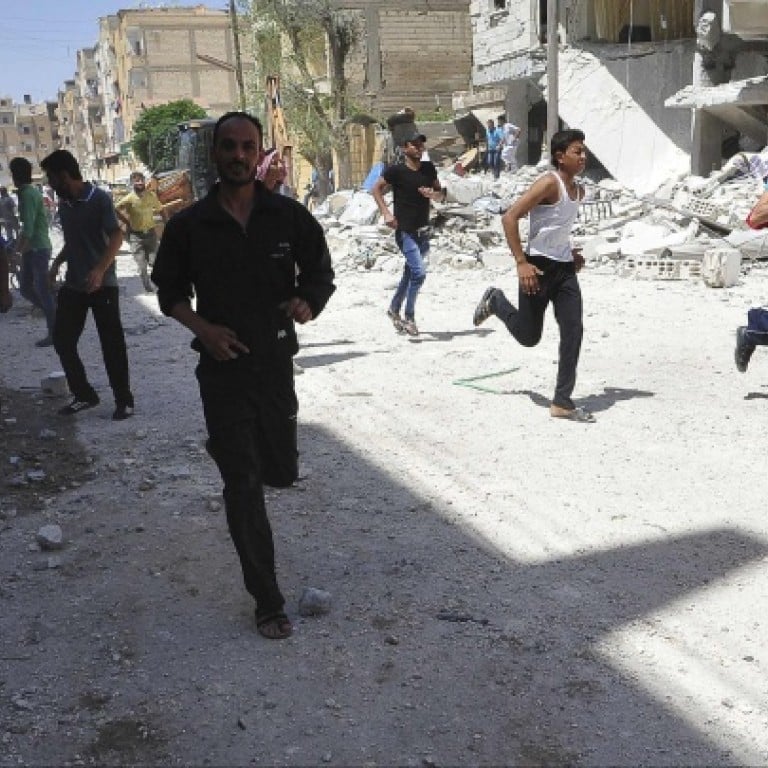
Syrian child execution by jihadist rebels puts militant justice in spotlight
Fighters shoot dead 14-year-old Mohammad Qattaa
Photographs of the bloodied face of a 14-year-old boy executed in front of his parents by jihadist rebels in northern Syria have thrown into stark relief the sometimes extreme justice meted out in rebel-held areas.
Fighters of Al-Qaeda front group the Islamic State of Iraq and Syria accused Mohammad Qattaa of blasphemy but a human rights group said he had done nothing more than use a common Arabic phrase that makes reference to the Prophet Mohammed’s name.
Pictures of Qattaa’s face, bloodied by the three shots that cut short his life on Sunday, spread like wildfire on social media websites, prompting a strong condemnation of his killing from the mainstream opposition.
“If someone shot a dog in the street, people would act,” cried the boy’s grieving mother Umm Mohammed in amateur video footage distributed by activists.
“Where are his rights? He was a child! How could they kill him?
“They killed him right in front of my eyes... May God take revenge on them... I saw his blood streaming down,” she wailed.
“We are with neither side (in Syria’s raging conflict). We just look after ourselves... Why did you kill my son? Is he a terrorist?”
The Syrian Observatory for Human Rights said the militants responsible for the boy’s execution were foreign volunteers with the al-Qaeda-linked Islamic State of Iraq and Syria.
“A member of the Islamic State of Iraq and Syria spoken to by an Observatory activist said the boy deserved to die,” said Observatory director Rami Abdel Rahman.
“Those who executed the boy were not Syrian,” he added.
Where are his rights? He was a child! How could they kill him?
Large swathes of northern Syria have fallen into the hands of various rebel groups, some of them Islamist, which have set up their own justice systems in areas they control.
Qattaa’s killing was the latest in a series of abuses by rebel fighters that have discomfited the mainstream opposition and its Western backers.
Just last month, amateur video showed a rebel fighter in the devastated province of Homs eating the organs of a slain soldier.
Opposition National Coalition member Alia Mansour said: “This execution is a crime against humanity and a crime against Syria’s revolution.”
“As the conflict develops, it is logical that we will see more problems of criminality emerge,” said Aron Lund, who has written extensively on the Syrian insurgency.
“The core problem in Syria, aside from the war, is the lack of law and order. Religious extremism is a response to the lack of law and order, as radicals see a chance to step in like a sheriff in the Wild West,” Lund told AFP.
“On the regime side, power is concentrated in Assad’s hands. But on the rebel side, it is more complicated because many insurgent groups are competing against each other for territory, and have many different ideas about how Syria should be ruled,” he added.
Alia Mansour of the opposition National Coalition condemned Qattaa’s killing.
“This execution is a crime against humanity and a crime against Syria’s revolution,” Mansour said. “We don’t want to exchange one killer regime for another.”
But Nadim Houry of Human Rights Watch said it was imperative that the opposition go beyond mere condemnation as allegations of abuses by rebel fighters were multiplying.
“Executions are on the increase, and a rising number of groups are taking the law into their own hands,” Houry told AFP.
“The rule of the gun is what dominates in Syria now, whether in opposition or regime-held areas. What is essential is that there be space for Syrian non-combatants to be able to speak up and condemn such acts,” he said.
“This kind of ability to mobilise and put pressure on the guys with the guns is essential for Syria’s future.”
Children have accounted for at least 5,030 of those killed in Syria’s raging war, which has left more than 94,000 people dead in 26 months. The majority were killed in regime shelling, the Observatory says.
